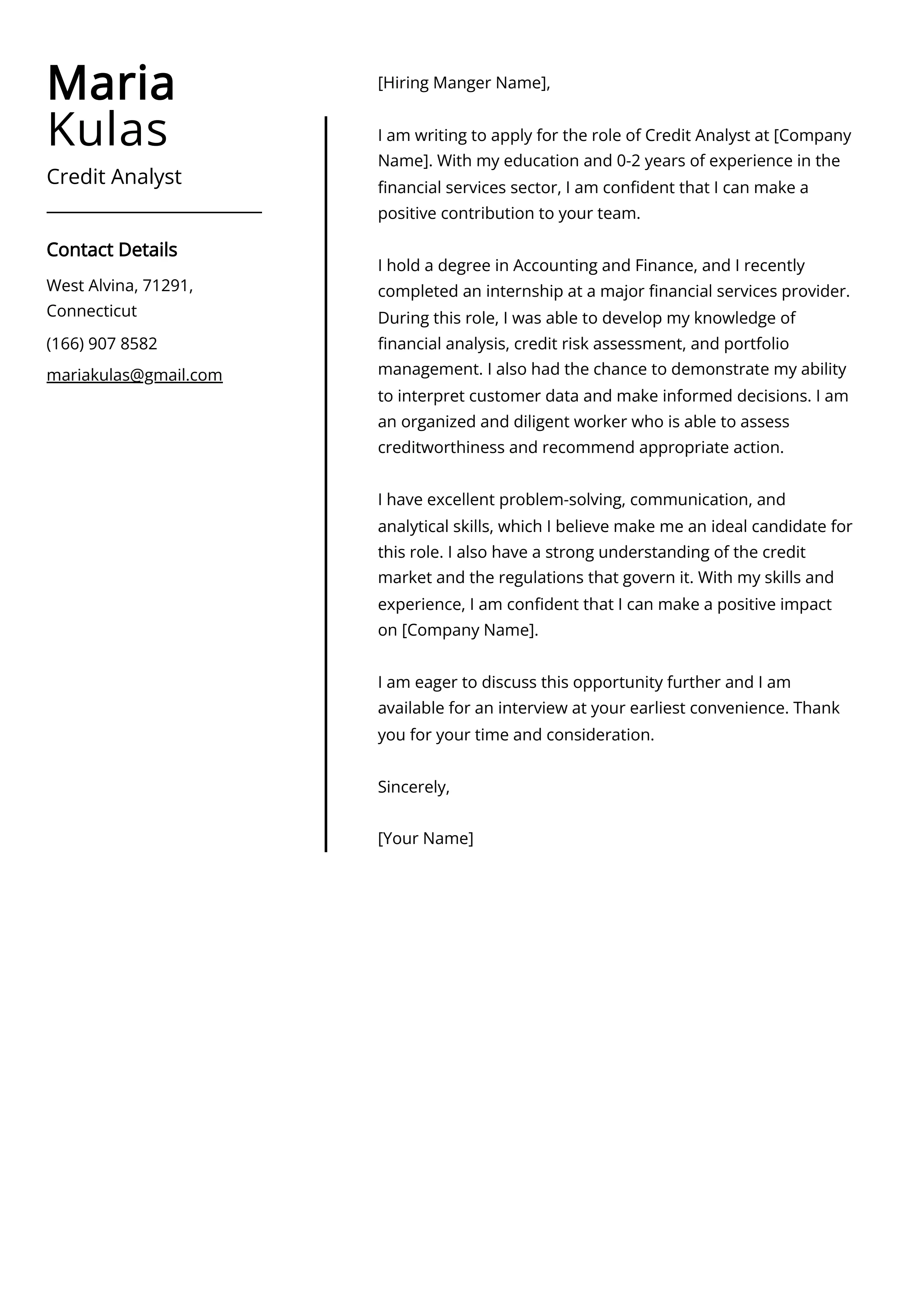Understanding the Credit Analyst Role
A credit analyst plays a crucial role in assessing the creditworthiness of individuals or businesses. They analyze financial statements, evaluate risk, and make recommendations regarding the extension of credit. Even without direct experience, understanding the core responsibilities of a credit analyst is the first step in crafting a compelling cover letter. This includes grasping the importance of financial analysis, risk assessment, and the ability to make informed decisions. The credit analyst role is all about managing risk, safeguarding financial institutions, and making informed lending decisions. Showing this understanding will immediately elevate your application. A well-written cover letter will help you demonstrate your grasp of these core principles, even if you’re just starting out.
Key Skills to Highlight
When you have no direct experience, emphasizing transferable skills is key. Focus on skills that are directly relevant to the credit analyst role, and provide examples of how you have used them in other contexts. This section will outline key skills that will help you stand out. Remember to tailor these skills to match the requirements listed in the job description. Highlighting these skills shows the hiring manager that you possess the fundamental abilities necessary for success in the role. Using concrete examples and quantifying achievements will make your application more persuasive and memorable, giving you a competitive edge.
Analytical Skills
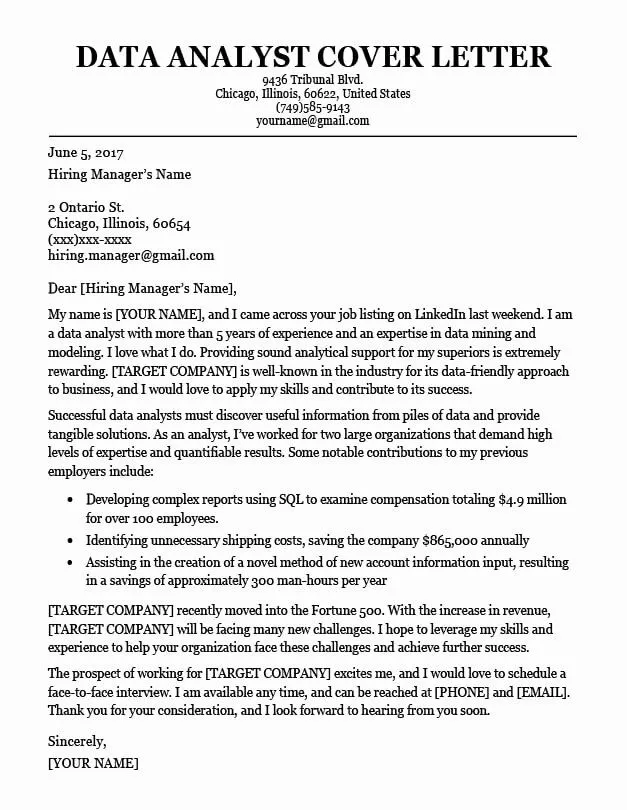
Analytical skills are at the heart of credit analysis. Demonstrate your ability to analyze data, identify trends, and draw conclusions. This could be from academic projects, research, or even part-time jobs where you had to interpret information. Show that you are adept at problem-solving and critical thinking. Credit analysts must be able to dissect complex financial data and make informed decisions. Detail any experience you have with data analysis tools or techniques, even if it’s not directly related to finance. Emphasize your ability to think logically and strategically. This foundational capability is highly valuable in any role that requires in-depth data interpretation.
Communication Skills
Credit analysts need to communicate effectively, both in writing and verbally. Highlight your ability to present complex information clearly and concisely. Provide examples of reports, presentations, or even emails you have written that demonstrate your communication skills. This includes active listening, explaining complex financial data to colleagues and clients, and clearly articulating your findings. Strong communication is vital for building relationships with clients and colleagues, as well as explaining credit decisions and recommendations. Emphasize how you ensure clarity and understanding in all your interactions.
Attention to Detail
Credit analysis requires a keen eye for detail. Mention any experiences where accuracy was paramount, such as data entry, proofreading, or meticulous project management. Show that you are organized and thorough in your work. Being able to identify errors, inconsistencies, and red flags is crucial. Highlighting these instances showcases your commitment to accuracy. Providing examples that demonstrate your meticulous nature will significantly boost your application. Mention any methods you use to ensure accuracy in your work, like checklists or review processes, as this will make you stand out.
Research and Investigation
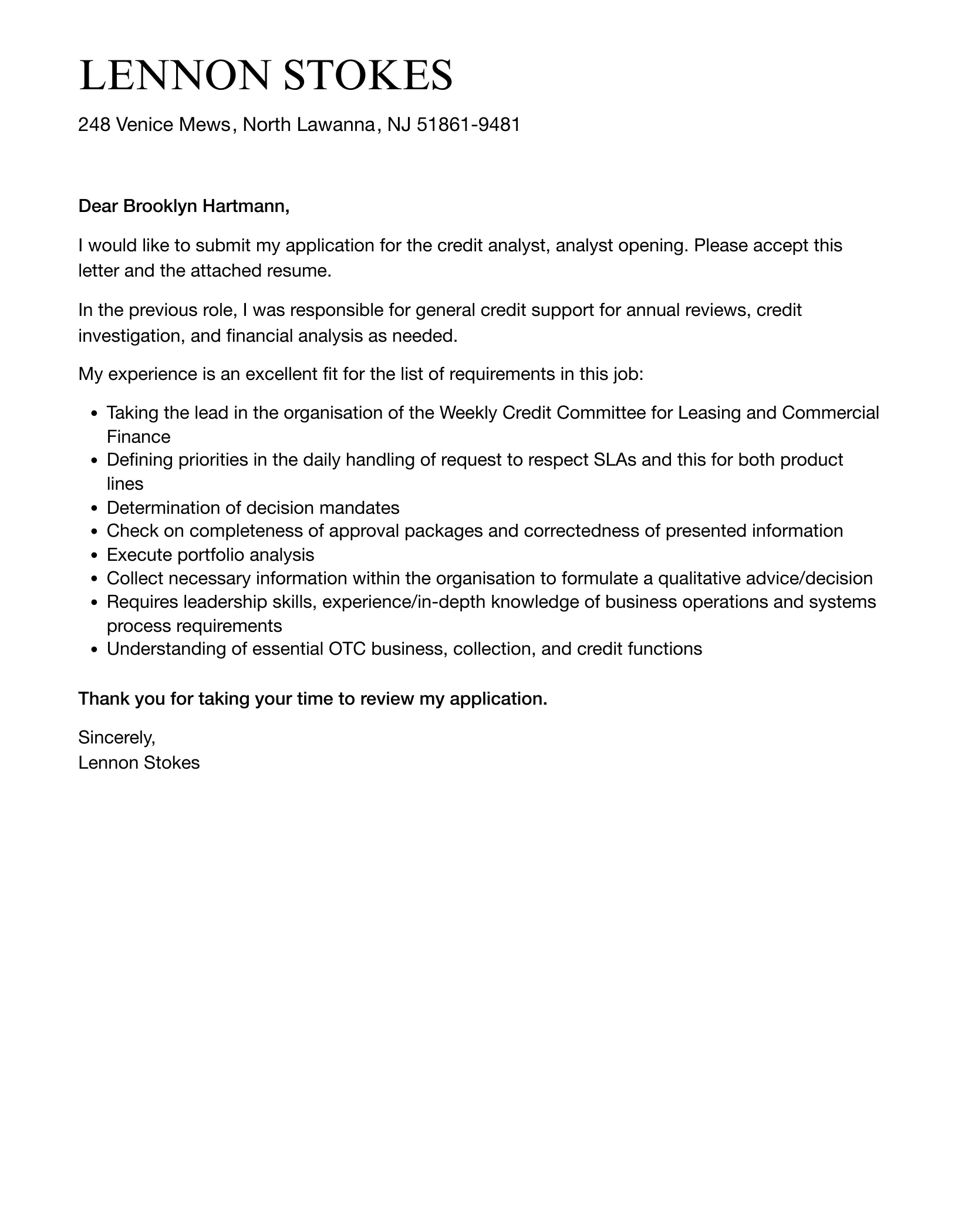
Credit analysts must be able to research and investigate financial data. Highlight any experience with research, data collection, or information gathering. Describe the methods you use to obtain information, such as searching databases, interviewing sources, or analyzing market trends. Research skills are vital for uncovering relevant information. Emphasize your resourcefulness and ability to find information from a variety of sources. Mention any instances where you were able to solve problems by gathering and analyzing information. Show the ability to assess the credibility of sources.
Tailoring Your Cover Letter
One size does not fit all. Customize your cover letter for each job application. This involves carefully reading the job description and identifying the key requirements. Then, align your skills and experience with those requirements. Do some company research to understand their values and goals. This will help you to showcase your understanding of the company’s needs. Using the exact keywords from the job description in your cover letter is a strategic move. This shows that you have the necessary qualifications and that you took the time to understand the specific requirements of the role. Tailoring your cover letter will help you significantly to demonstrate your genuine interest in the position.
Highlighting Transferable Skills
Even without direct credit analyst experience, you likely have transferable skills that can be applied to the role. These might include analytical, communication, problem-solving, and organizational skills. Give specific examples of how you’ve used these skills in previous roles or academic projects. Think about instances where you analyzed data, solved problems, communicated complex information, or managed multiple tasks. Make sure to quantify your achievements whenever possible. Demonstrating these skills helps bridge the experience gap. Show that these skills have helped you achieve positive results in other contexts. These types of transferable skills can demonstrate your ability to succeed.
Showcasing Academic Achievements
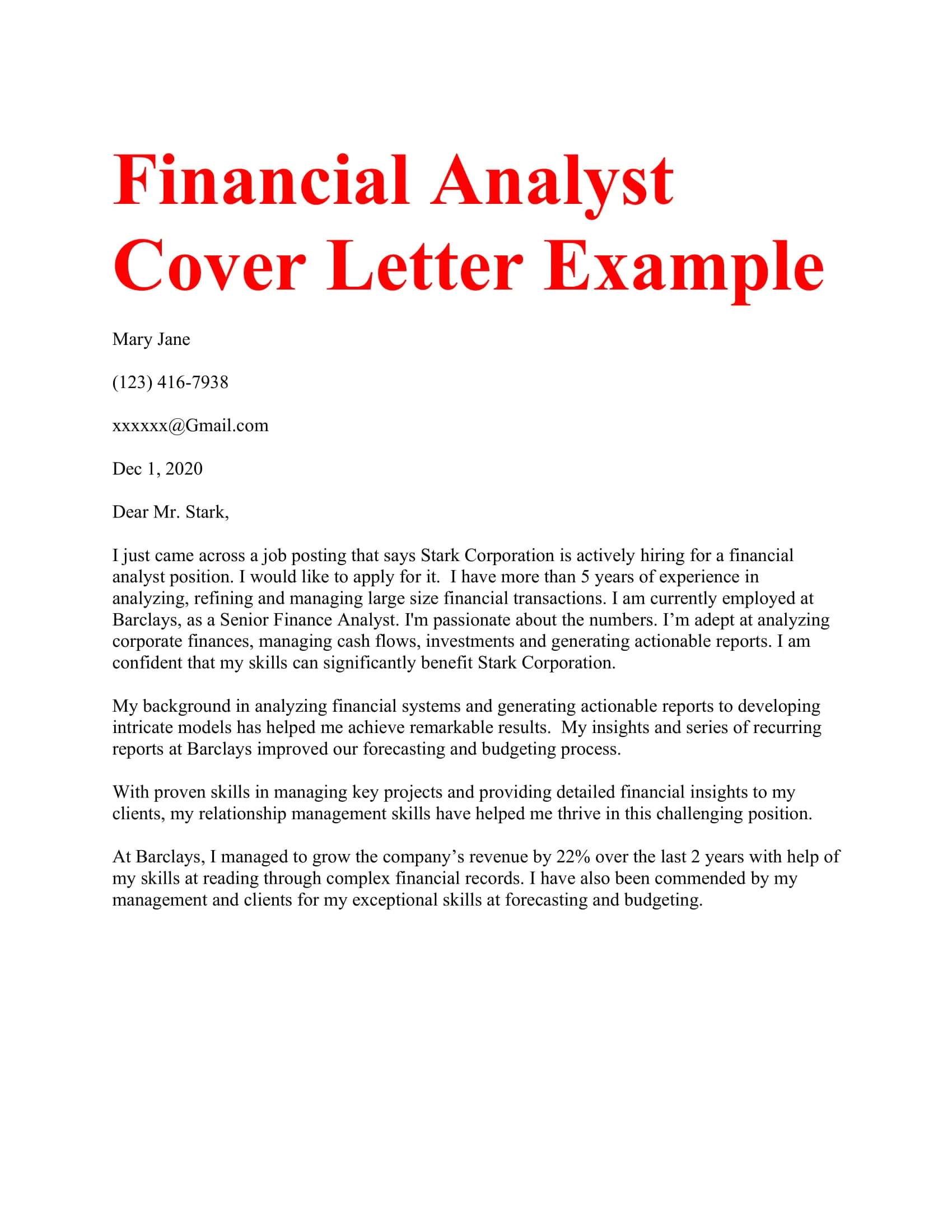
Your academic achievements can significantly boost your cover letter. If you have a degree in finance, economics, or a related field, make sure to mention it prominently. Highlight any relevant coursework, projects, or research that demonstrates your understanding of financial concepts. Include your GPA if it’s strong, and mention any academic honors or awards you’ve received. Detail any projects that involved financial analysis, research, or data interpretation. Emphasizing your academic accomplishments shows that you have a solid foundation of knowledge and skills. These achievements serve as a strong indicator of your potential and abilities.
Formatting Your Cover Letter
Proper formatting is essential for creating a professional cover letter. Use a standard business letter format, and make sure your letter is easy to read. Choose a clean font like Times New Roman or Arial, and use a font size of 11 or 12 points. Use consistent spacing throughout the letter. A well-formatted cover letter will make you look polished. This is critical for making a positive impression and increasing your chances of getting noticed. The format should be clear and easy to read. This shows that you respect the reader’s time and attention.
Contact Information and Date
Start with your contact information (name, address, phone number, email address) at the top of the letter. Include the date below your contact information. This section is essential for allowing the recruiter to reach you easily. Your email address should be professional. Always ensure that the date reflects the day you are sending your cover letter. The accuracy of these details shows your attention to detail and professionalism. Providing this information is non-negotiable; it’s a basic requirement for any professional communication.
Professional Salutation
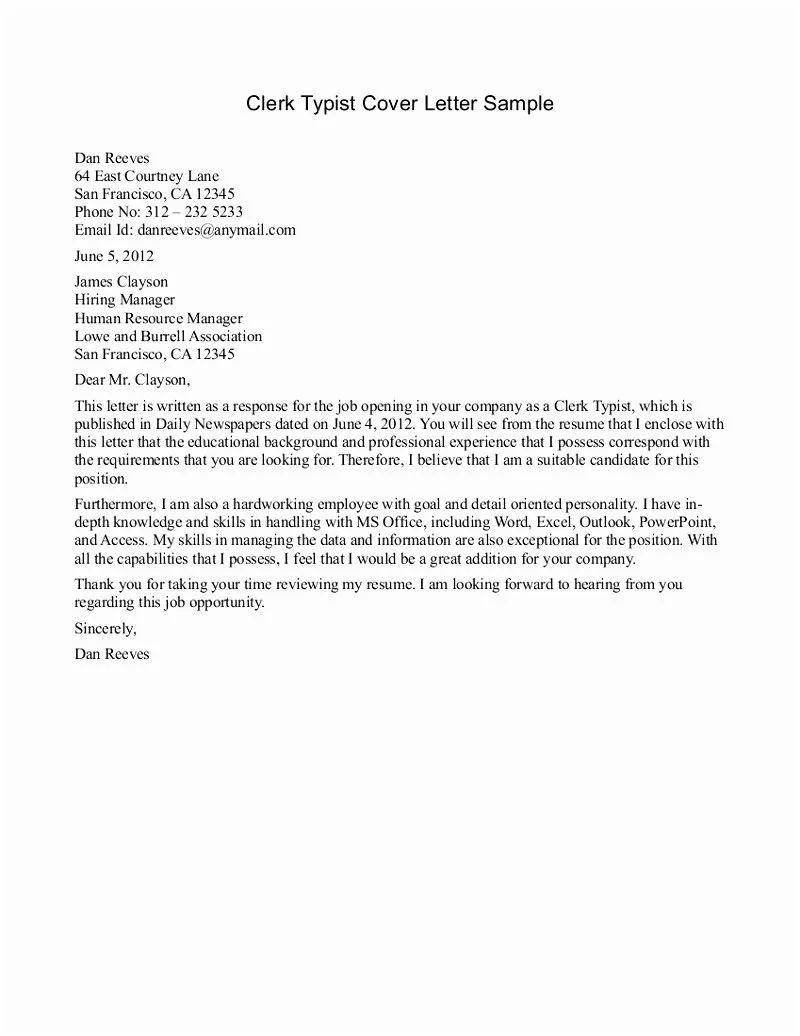
Use a professional salutation, such as Dear Mr./Ms./Mx. [Last Name], or Dear Hiring Manager, if you don’t know the name of the person. Avoid generic greetings. If you can, address the letter to a specific person. Research the hiring manager’s name and address them directly. Personalizing the salutation shows that you’ve done your homework. Using a specific name makes your letter more personal. It also demonstrates that you are truly interested in the position.
Body Paragraphs
The body of your cover letter is where you demonstrate your qualifications. The body should include a concise opening paragraph, followed by one or two paragraphs highlighting your skills and experience. Be sure to clearly state your interest in the position and why you are a good fit. Each paragraph should have a clear focus. Use specific examples to support your claims and make your application more compelling. Keep the language direct and concise. The body paragraphs should make a strong argument for why the company should hire you. This is your main opportunity to showcase your fit for the role.
Closing and Call to Action
End your cover letter with a strong closing statement, expressing your enthusiasm and summarizing your key qualifications. Thank the reader for their time and consideration. Include a call to action, such as requesting an interview or expressing your interest in learning more about the position. This will signal your desire to take the next step in the application process. Make sure to keep the tone of your closing paragraph positive and enthusiastic. The call to action makes it easy for the reader to know the next step to take. Ending with a clear action is vital.
Essential Cover Letter Components
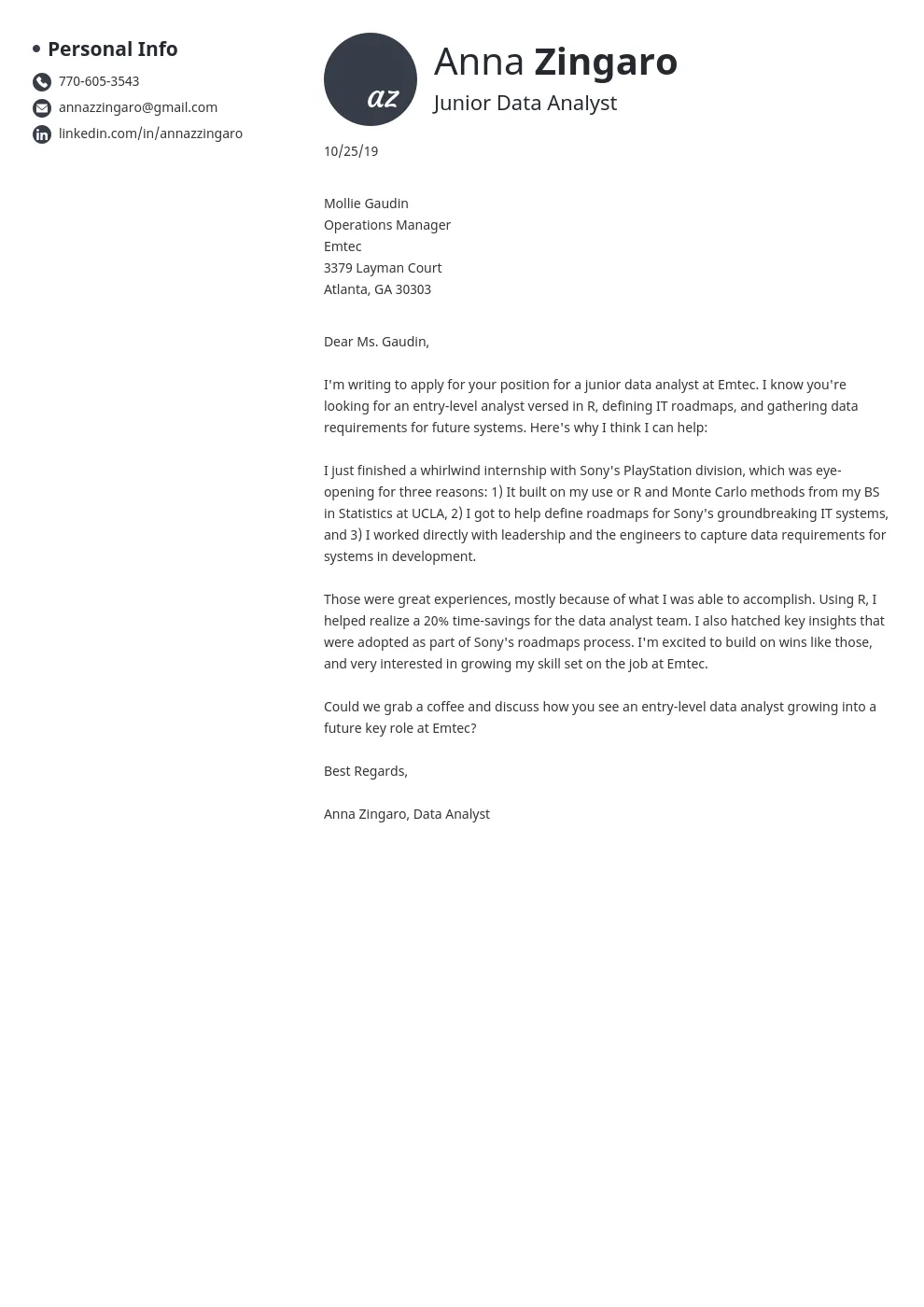
Ensure that your cover letter includes all essential components. This includes a well-crafted opening statement, skills and qualifications, evidence of company research, enthusiasm, and a strong closing statement. Each component must contribute to building a compelling case for your candidacy. Properly structuring and formatting your letter is crucial. These components work together to present a complete picture of your skills and experience. Make sure you include all the necessary elements.
Opening Statement
Start with a compelling opening statement. State the position you are applying for and where you found the job posting. Immediately capture the reader’s attention. Briefly explain your interest in the company and the role. Emphasize why you are a good fit. Your opening statement should immediately convey your enthusiasm and interest in the position. Making a strong impression with this initial paragraph sets the tone. Keep your opening concise and to the point.
Skills and Qualifications
The core of your cover letter is the section on skills and qualifications. This is where you showcase your abilities and explain how they match the job requirements. Use specific examples to illustrate your skills, even if you don’t have direct credit analyst experience. Explain how your transferable skills align with the needs of the role. Quantify your achievements when possible. Be sure to explain how your background and skills meet the job’s specific needs. This is a critical section to show how well you are suited to the position.
Company Research
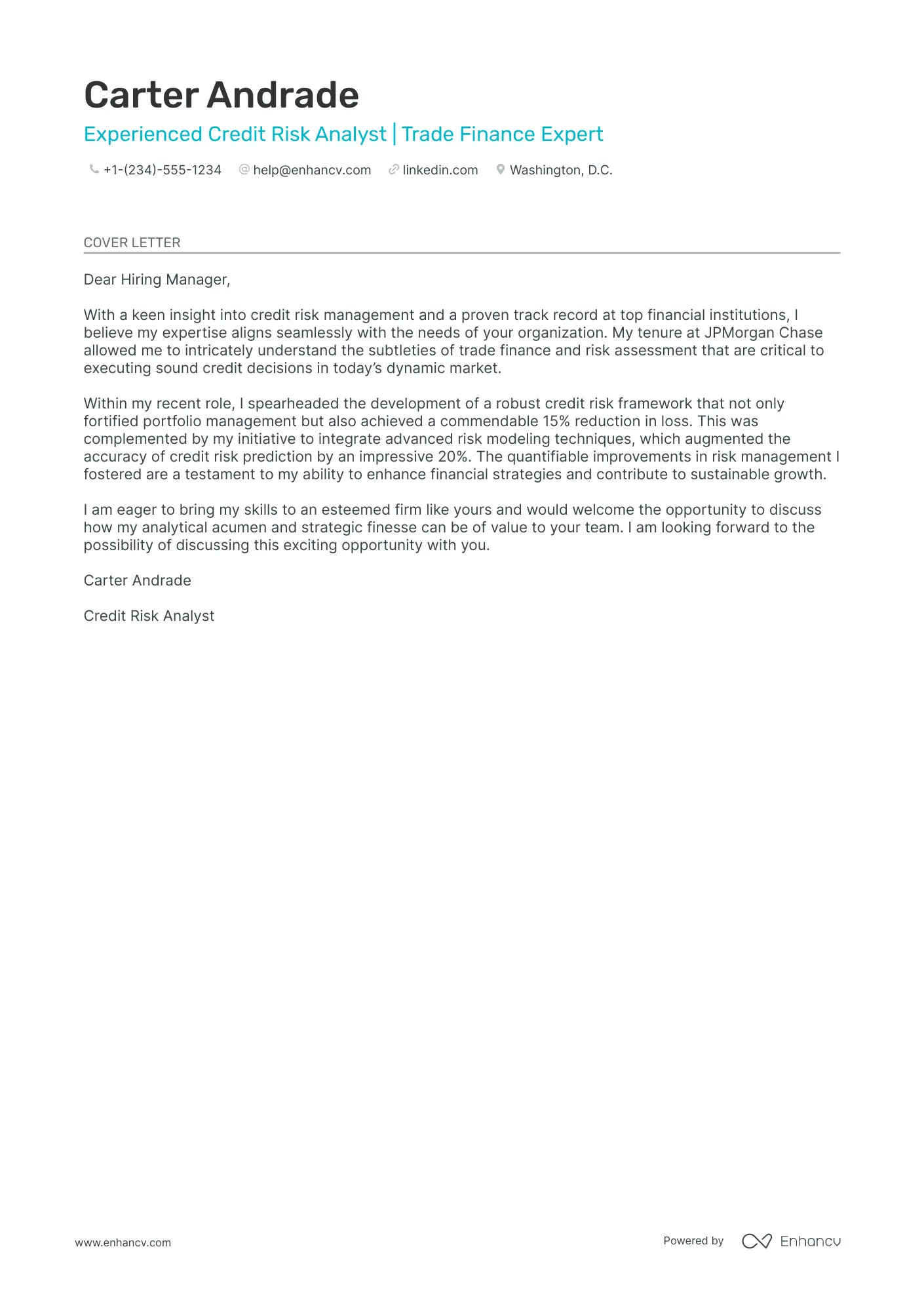
Show that you have researched the company. Mention something specific that attracted you to the company. Demonstrate your understanding of their mission, values, or recent accomplishments. Customize your letter to fit the company’s culture and values. This shows that you took the time to learn about them. Your research will make your application stand out. Tailoring your letter shows you are really interested in the position.
Enthusiasm and Passion
Convey your enthusiasm for the credit analyst role. This can be done by expressing a genuine interest in the company and the industry. Use positive language and avoid sounding generic. Show your excitement about the opportunity. Passion will demonstrate you want the job and fit into the team. This will help you stand out from other applicants.
Closing Statement
End your cover letter with a strong closing statement. Reiterate your interest in the position. Thank the hiring manager for their time and consideration. Include a call to action, requesting an interview or expressing your interest in further discussion. The closing statement should be memorable. End with a clear call to action, encouraging the reader to contact you. Make sure your closing shows your enthusiasm and your professional attitude.
